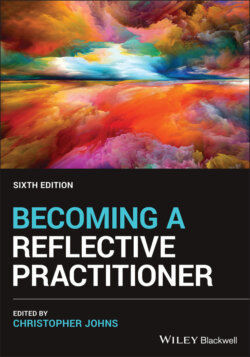Читать книгу Becoming a Reflective Practitioner - Группа авторов - Страница 51
Dialogue
ОглавлениеDialogue is the core of reflective learning. Dialogue comes from the Greek word dialogos – ‘meaning flowing among and through us, out of which may emerge some new understanding’ (Bohm 1996, p. 6).
TABLE 2.1 The Six Dialogical Movements of Reflective Learning Within the Hermeneutic Spiral
| Dialogue with self as a descriptive spontaneous account paying attention to detail of the situation (produce a story text); |
| Dialogue with the story text as a systematic process of reflection to gain insight (produce a reflective text); |
| Dialogue between tentative insights and other sources of knowing to position insights within the wider community of knowing; |
| Dialogue with guide(s) and peers to challenge and deepen insights (co‐creating meaning); |
| Dialogue with the insights to weave a coherent and reflexive narrative text that plots the unfolding journey of being and becoming; |
| Dialogue between the narrative text and its audience as social action towards creating a better world. |
Isaacs (1993, p. 25) describes dialogue as:
a discipline of collective thinking and inquiry, a process for transforming the quality of conversation and, in particular, the thinking that lies beneath it… a movement towards creating a field of genuine meeting and inquiry where people can allow a free flow of meaning and vigorous exploration of the collective background of their thought, their personal pre‐dispositions, the nature of their shared attention, and the rigid features of their individual and collective assumptions. As people learn to perceive, inquire into, and allow transformation of the nature and shape of these fields, and the patterns of individual thinking and acting that inform them, they may discover entirely new levels of insight and forge substantive and, at times, dramatic changes in behaviour. As this happens, whole new possibilities for coordinated action develop.
Dialogue is not a natural form of communication, especially within organisations.
Isaacs notes (1993, p. 24):
Most forms of organisational conversation, particularly around tough, complex, or challenging issues lapse into debate (the root of which means ‘to beat down’). In debate one side wins and another loses; both parties maintain their certainties, and both suppress deeper inquiry. Debate reflects patterns of power relationships and rivalry, where people jostle for control typified by people lining up to get their point across and win the argument. Very little genuine listening takes. People partially listen to what they want to hear, seeking feedback to reinforce their position rather than be open to new possibility through dialogue.
